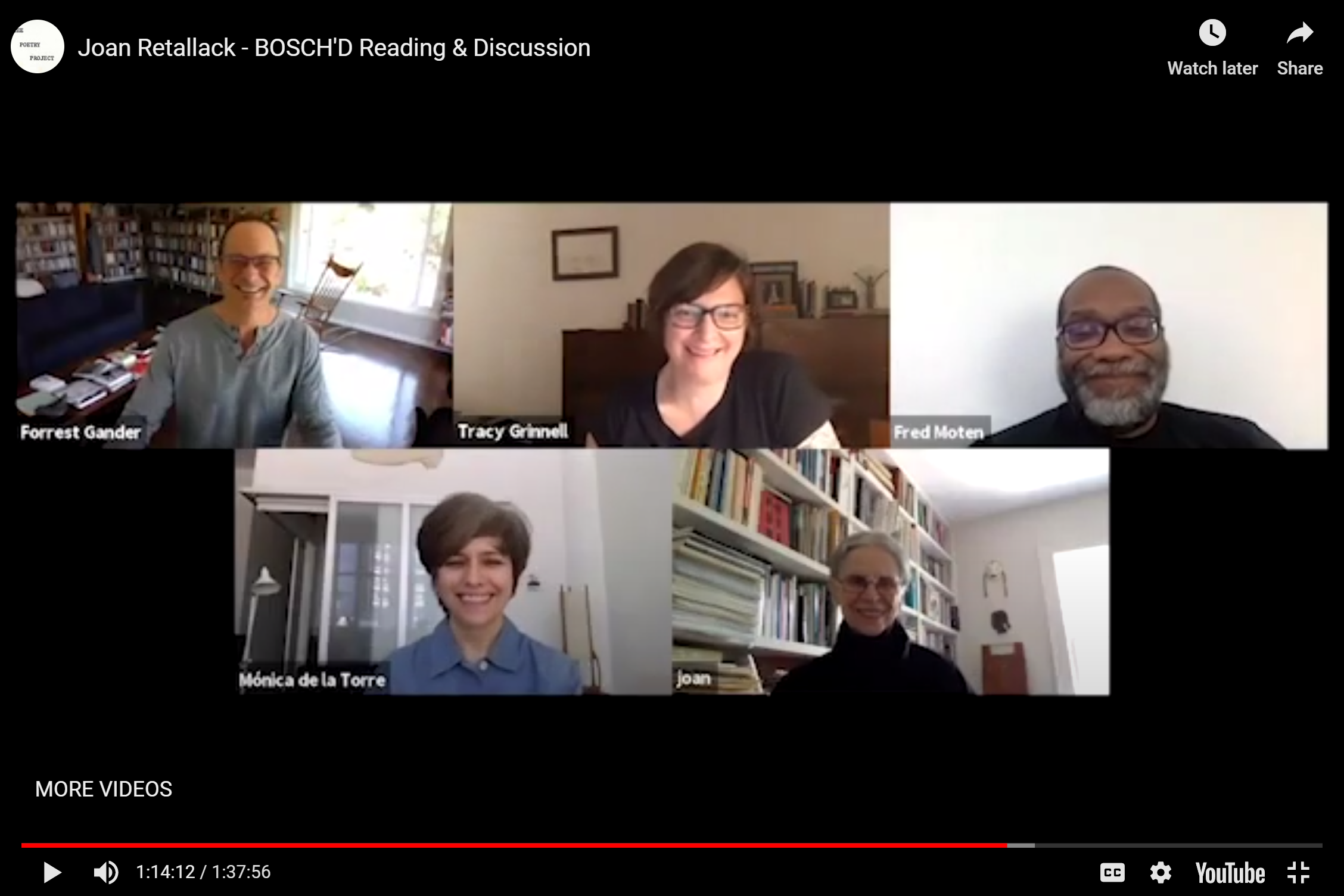BOSCH’D – A Dialogue in the Swamp w/ Retallack, Moten, de la Torre, and Gander

Joan Retallack’s poetry collection, BOSCH’D—fables, moral tales & other awkward constructions, reminds us of the beauty that can be found when relinquishing what we can’t control and of the rejuvenation that comes from realizing the possibility of our own actions. My journey through the many worlds of BOSCH’D began with a digital launch recording hosted by The Poetry Project.
As introduced on The Poetry Project’s website, Litmus Press joined The Poetry Project’s House Party #13 back in June to celebrate “the publication of Joan Retallack’s BOSCH’D—a book which, inspired by that great painter of both ecstasy and struggle, Hieronymus Bosch, explores themes of reckoning, conflagration, and transformation. The issue features a reading and discussion, accompanied by excerpts from the book, with Mónica de la Torre, Forrest Gander, and Fred Moten, joining Retallack and E. Tracy Grinnell to celebrate BOSCH’D through an exploration of etymology and origins, methodologies for thinking and ways for being.”
Gander starts off the dialogue with a question about etymology.
Gander: “All three of you use etymologies in a different way, a less problematized way, and [I wonder] if you see there being a problem with using etymologies as kind of an anchoring word or origin or source truth.”
The conversation moves through and against this question. Through and against etymology, its playfulness, its uses, its attempt and inability to act as anchor or source of truth.
Retallack: “I don’t count on some sort of ultimate truth in [etymology]… I think it is really important to notice how words were used and understood to the extent that we can, historically, while never thinking of that as conclusive evidence of anything.”
Retallack reminds us we are not searching for truth, but rather trying to understand how truths shift and change through time, through people. De la Torre asks us to then purposefully misunderstand, upend authority.
de la Torre: “I find it really fun to go back to the source to undo the authority that the authoritative source conveys… and also mishearing, misunderstanding, refracting it… you approach one of these etymologies deliberately with the intent on misunderstanding it through a different language… that is what I find tremendously generative when it comes to refraction.”
Through refraction, we can crack open words and history bogged down by authority and oppressive sources, and generate meaning that makes sense of where we are now. De la Torre allows truth itself to unravel and become something new, something that rejects the notion of authority and solid linearity.
Then, Moten brings us to wormholes and swamps.
Moten: “I think a book like BOSCH’D is a kind of a big huge complex of wormholes. Like some kind of cosmological terminal that you can go to for various forms of travel… [There are] words or doorways you go through in order to get on whatever ship you get on… of course you don’t know where you’re going to go, but it’s going to be someplace interesting and it’s not really ever going to be back to anything like an original source.”
BOSCH’D gives the option of journeying. We don’t have control over where we end up, but we can choose the direction of our next step, the doorway we walk through, ready to encounter the unfamiliar and innovative.
Moten continues: “Etymology works that way. As [you] try to trace it back as far as [it goes]… it’s not a dead end, but the search peters out. The search for the source—you end up in a muddy swamp kind of thing and you just can’t quite locate it. You know there’s somewhere further back you could go, you just don’t quite have a way to get there.”
In a time of uncertainty, unsettling wariness, and loss, this conversation about BOSCH’D, it’s unraveling and confrontation of truth, and about the tangled paths poetry accesses, reminds me of the muddy beauty of a swamp. Created by both land and water, swamps very literally are places of transition. They are biodiverse, full of life, and supply fresh water and oxygen, undeniably providing important nutrients for us to live and breathe. In constant flux, swamps are unsettling, but they are also full of possibility. They are not spaces of clear definition, but rather, they make way for many possible journeys and outcomes. We simply need to choose a direction.
Explore the multimedia House Party, experience this conversation in-full, and dive into a writing prompt from BOSCH’D here: https://www.poetryproject.org/publications/house-party/house-party-13
— Aliera Dulcinea Zeledon-Morasch (she/her), Editorial Assistant
